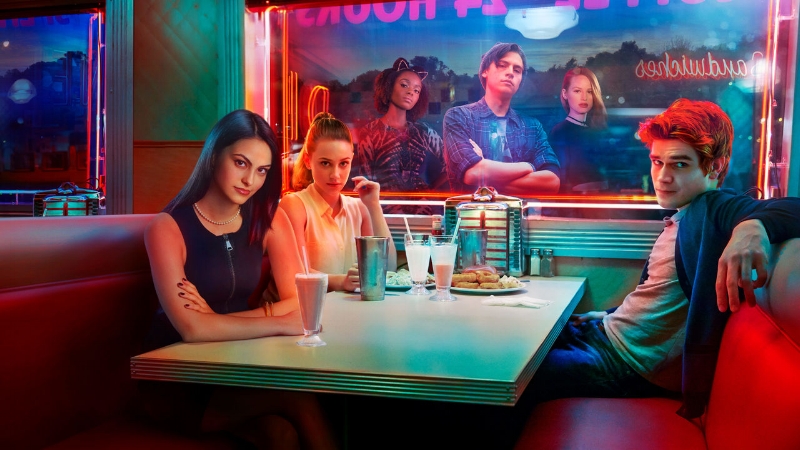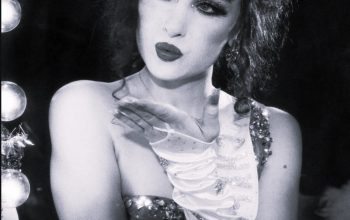Netflix’s 2017 reboot as seen through the eyes of a long-time fan
Rashida Abbas – CONTRIBUTOR
When I say Twin Peaks, what pops up in your head? Teen murder, small-town, dark, gritty, and Riverdale! That last one may seem out of place, but the majority of critics, reviewers, and fans agree that 2017’s opening into the world of a small-town solving the mystery of a teenage murder is highly reminiscent of the 1990’s Twin Peaks murder-mystery drama. In fact, it seems you can’t review Riverdale without at least once mentioning Twin Peaks. (Note: I will not be mentioning this name henceforth. It will instead be referred to as “the show that must not be named.”)
Well, being the annoying exception to the reviewer’s rule, I’m going to hazard a risk and say that although Riverdale may, on the surface, check off all the boxes for a dark and meaty teenage drama, it most definitely does not stop its run at that. If it were just another “show that must not be named,” then we might as well just revive the original drama (which, by the way, is happening) and sideline Riverdale into being its neglected sibling. However, viewer ratings and a second season renewal seem to suggest otherwise. What is really driving Riverdale’s success — if not its superficial tryst into the land of dirty teenage politics, Machiavellian parents, and life-like corpses (Jason Blossom as a zombie, anyone?).
For one, the nostalgia of seeing our beloved comic-book childhood buddies Archie, Jughead, Betty, and Veronica on-screen is off the charts. I speak only for those who have in some way or other interacted and formed a relationship with these goofy and amiable characters. This nostalgia I would say is the impetus for both the rebooted live-action drama’s birth and sustained success.
Still, although I agree that nostalgia plays a big role in my continued devotion to Riverdale, it’s still not the full story. As a rule-of-thumb I cannot tolerate shows that belittle or undermine the significance that characters, setting, pacing, plot, structure, and style hold for the cohesiveness of the narrative, or shows that are solely written to bank on the commercial interest and value of the narrative (the few that I can think of are Arrow, Flash or Supernatural). With this rule of thumb in mind, Riverdale plays itself into being a “serious” show that possesses neither of these traits. Of course, I know that to a certain extent, every show and script writer is cognizant of the necessity of commercial success, Riverdale’s dialogue, pacing and plots beg a more in-depth reading and viewing as opposed to the get-in-get-out mind-numbing entertainers that teenage dramas often end up being (goodbye Vampire Diaries!).
Riverdale’s screenwriters self-consciously select topical issues that teenagers, typically females, face in high school today and transport them into Archie’s neo-noir world. An example would be Betty and Veronica teaming up to defeat Chuck and his gang of football players by exposing their game book, which boasts of each member’s sexual encounters with females. The girls ultimately end up victorious, in an apt twist that makes the conqueror the conquered. Although this brief synopsis seems like a page (or should I say, script) torn right out of a teen drama novel, the special attention given to dialogue and characterization works to distill the feminist rights movement into Riverdale. On the surface, it appears to be petty teenage theatrics, but the show treats the topic of female objectification and silencing with care and consideration. It does so not only by empowering the cowed female teenagers through Veronica’s (and, surprisingly, Betty’s) bold stances, but also by uniting the mistreated girls from each rung of the social hierarchy, thereby collapsing the hierarchal structure that most shows display high schools running on (popular kids –> jocks –> geeks –> weirdos). Ethel, who is depicted in the older versions of the comics as a goof-ball, not-to-be-taken-seriously secondary character, is suddenly reborn with a sombre and determined outlook on her mistreatment by Chuck. So, not only do we have a complete obstruction of the usual high school social structure, but also marginalized characters, like Ethel, given a voice to effect a change in female representation. In actuality, Riverdale is cleverly uses the guise of a typical high school drama to explore globally relevant dilemmas. Neat, eh?
Ethel’s reinterpretation as a new age, outspoken female liberalist is a well-needed breath of fresh air, but also speaks to the many other character reinventions we see. Now, as an avid bookworm, I am supremely suspicious of book-to-film adaptations — especially those that take antiquated texts and bring them into contemporary media (a few off the top of my head are The Giver, Macbeth, Victor Frankenstein). But in the case of Riverdale, transposing these beloved characters from the 90s into 2017 and restyling the show as a darker version of Archie Comics is effective: I’d even go as far to say that it’s obligatory. The relocation of the light-hearted and comical version of the past Archie Comics into the dark and gritty world that is present-day Riverdale sounds like a recipe for disaster, or at least, a complete disfiguration of my cherished Archie Comics. However, I was delightfully surprised at how well the screenwriters have maintained the core of the character while still decorating them with a moody exterior. In the comics, Jughead is your run-of-the-mill oddball who, if translated verbatim on screen, would appear one-dimensional and papery. That is to say, the one-dimensional stock characters and slapstick comedy work in the comics, but wouldn’t survive in the vibrant world of television shows. In which case, it only made sense that the show’s creators and writers reimagined silly characters like Jughead and Archie as a sullen, burgeoning writer and a confused musician-jock, respectively.
Now, don’t get me wrong — you still see Jughead glued to the seat at Pop Tate’s (his favorite place in town), and you still see Archie’s kind-hearted and heroic nature (like when he gives up team captain so Reggie can have it). But these core, stock traits, are elaborated on by the writers to answer the generational question of how Archie, Jughead, and their friends have evolved to fit in the globalized, techno-wild world of today. We see this in its references to Mad Men and many other popular shows and movies, finding our dear characters effectively immersed in the popular culture that they too are unknowingly a part of. This Riverdale is the one we would see in our world today, not the glorified and idealized world of tomorrow represented in the comics.
In fact, I’d go one step further and suggest that the show itself points to this tension between the nostalgia of childhood past and the present adaptation of Archie that depicts the future direction of Archie and his friends in Episode 4: “The Last Picture Show,” wherein Jughead is embroiled in saving the town’s historic landmark, the drive-in, from corporate greed. Throughout the episode we have a classic playing out between Jughead’s emotional attachment with the drive-in and the Lodge’s hunger for land. Jughead struggles to fight against the corporate monster that is determined to swallow up not only the town’s historical marker but also the marker of the good old days he had with Jellybean, his sister. Sound familiar? It’s almost like Riverdale’s screenwriters are trying to pay respect to generations of Archie Comics and their multitudinous fans whilst simultaneously introducing a fresher, murkier, more realistic take on this world, thereby attracting a younger fan base: “Out with the old, in with the new.” Although the episode resolves its conflict with a clear win for the Lodges — and by extension, for the present — the show itself remains on the fence about this tension. This sentiment is well captured when Jughead says, “The drive-in closing is the last nail in the coffin known as the American dream,” while comfortably enjoying his favourite cheeseburger at Pop Tate’s.
There is a departure that Riverdale takes from the tried-and-tested representation of the quintessential American dream by making the style of the show neo-noir; still, it stubbornly and rightfully holds on to its comic-book roots, never forgetting where it came from (Jughead’s relationship with his burgers is indelible and girls fawning all over Archie will continue to remain timeless). I’m game for more of this sort of balance between giving the fans what they want and coating it in an edgier style.
On a side note, there’s actually a lot of mirroring and echoing happening within episodes itself, which affords the plot and writing a smooth and unwavering flow. Jughead’s fight to save the drive-in is similar to Archie’s fight to save his relationship with Mrs. Grundy. Both Archie and Jughead try to work against the odds and pursue a goal (or, in Archie’s case, a dream) that has no room to survive in the contemporary era they are thrust into. As Veronica says, “In the age of Netflix and VOD, who’s going to watch a movie at a drive-in?” Again, the tension between past and present, new and old, traditional and modern seems to be pervasive and on-going within the narrative, speaking not only to the changes occurring within Riverdale, but also the ones occurring outside of it: in our world.
Finally, besides the show’s treatment of its plot and characters, I have to commend the screenwriters for choosing actors that fit right into the skin of the character. One that comes to my mind is not only my personal favourite, but also the actor I respect the most—a double whammy: Cole Sprouse. Jughead has been a fan favourite not just because of his outsider depiction in the comics, but also because of his enigmatic and mystical exterior. We all love a character we just can’t figure out. In the comics, at times, he seems almost Zen; elsewhere, he appears to have lost his head (though never his hat). Of course, the comics use this dichotomy to produce a humorous effect. However, I think the show very neatly merges these opposing qualities. In Riverdale’s Jughead, we see an ostracized, emo teenager trying to help his friends with their problems, while at the same time maintaining a safe distance from the events surrounding Jason Blossom’s murder by writing a novel about it. So, he’s willing to involve himself in the world of Riverdale only for his friends (loyalty to his friends is something we see in the comics too), but struggles to maintain impartiality while writing.
An interesting growth I continue to see in Jughead through the episodes is that, as he gets more involved with Betty and invested in the search for Polly, his writing becomes more focused on the characters and their respective problems. That’s to say, each episode begins and ends with a circular narration given by Jughead following a common theme. Sometimes, it’s about fear; other times, it’s about home or hope. Each episode is titled as though it were a chapter in Jughead’s novel, so it only makes sense that each episode has an underlying theme connecting each subplot. Jughead’s narration is a tool the show uses to stitch the different subplots into a cohesive tapestry of murder, drama, and a lot of singing. It’s fitting to have Jughead, who has always, in the comics and shows, been the writer and maintained his status as a recluse, for what is a writer if not the observant/reclusive narrator — if not the occasional sardonic oddball?
As for Cole Sprouse, who plays Jughead: I truly enjoy watching him on-screen because he embodies the role of the sarcastic neo-noir pseudo-sleuth narrator. I feel we need more of him, but that might be my bias speaking. Anyhow, from what I’ve seen, Sprouse’s acting has definitely blossomed from his puerile Suite Life days into a more mature and artistic rendering of Jughead in Riverdale. I especially appreciate the nuances he affords Jughead, like the slight pout he does to signal that he is about to crack a joke, or the long, hard, and intense stare he gives Betty before he kisses her. All of these gestures and behaviours are very much what a more serious version of Jughead would do. (In fact, if comic book Jughead were to come to life, he’d probably say the same, albeit, ironically.) I trust Sprouse to bring the best and the worst aspects of Jughead into the 21st century — and that’s saying a lot, because for me, Jughead is a cherished childhood treasure on whom I would otherwise hate to see any scratches or blemishes.
On a final note (I promise, the last), just like “every small-town has its secrets,” so too, Riverdale has its own tricks which it continues to surprise us with. Whether through an intense reworking of each Archie Comics character or a bold taking-up of significant global issues, Riverdale never fails to excite us with whatever new reinvention it will bring into the previously happy-go-lucky world of Archie Comics. Of course, whatever happens, Jughead must not lose his hat, Betty must not lose her diary writing, Archie must not lose his red hair, and Veronica must not lose her sass. Some things will and must always remain sacred, even in today’s ever-shifting world.




